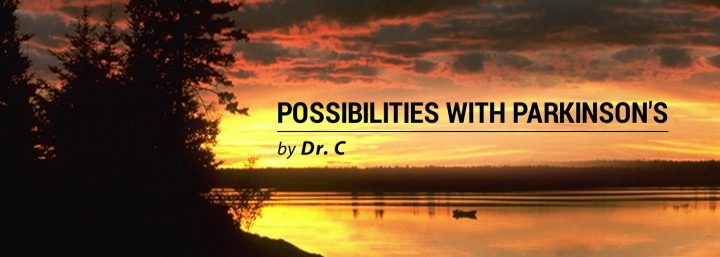It’s the Little Things that Help with the Big Things

“Be one with the moment.” Hogwash! I can’t be one with the darkness. Yet, I do understand the power of the darkness for shaping my behaviors. I see the darkness as pure survival and protection against possible threats. It is a hyper-focus on self-survival along with unhealed battle wounds that constantly provide mortar for the walls of defense. There’s little room for empathy and compassion. It is a good state of consciousness for a solo battle against threats of harm, but potentially damaging on personal relationships. I’m rarely consumed by darkness. However, I’m daily touched in little ways by the wounded warrior state of consciousness.
Every day, I have short emotional, frustrated outbursts (expressed internally, mostly) connected to my decreased motor coordination and loss of vision abilities. Add in chronic pain and surges of exaggerated emotion, and the result is that I work hard to calm my emotions dozens of times during the day. I was surprised — and I don’t usually get surprised — at how small these inner outbursts are in their beginnings. They only grow larger when left unattended, much like all the overgrown weeds in the unattended yard of my new home. Building a new sanctuary at the new home requires looking past the weeds, not getting overwhelmed with how much work there is, and being pleased with any progress. The same can be applied to personal healing work.
The journey taken to arrive at my new home was the hardest thing I have ever done. I became quite ill along the way. I wasn’t eating, exercising, or socializing, and was barely able to eke out these columns every week. My body had trouble doing the simplest of things, such as going to the store with my partner for groceries. I am a mess. Recovery from a serious health setback like this takes courage, patience, and support from friends and family. The healing relationship provides a map, but that map is very fragile in the beginning stages of recovery. I promised myself I’d find a way to heal, to do it better and to record the journey in these columns. If I can’t walk it, I’m not going to talk it.
In the past, I was happy to keep big outbursts out of the home and out of important relationships. That has changed with the idea that the little inner emotional outbursts are equally important. This was discovered while gardening. The soil here is very clay-rich. I can grab a hunk and shape it into a baseball that keeps its shape when thrown. The soil also holds a lot of water. In addition, our new yard has a lot of trees. The combination of wet, clay-rich soil and lots of tree roots complicates creating new garden beds. I found myself struggling physically and swearing at both the clay soil and the roots. I don’t think they heard me; they were still in the way of my next shovel thrust.
This may seem obvious, but the soil isn’t trying to be annoying and the roots are not trying to get in my way. I chose to build the garden beds at this location for aesthetic reasons. This means I chose the location because I can see in my mind the vision of a sanctuary that will surround my home when I am done. What I should say is, “Be happy for the opportunity.” With every shovelful of wet heavy root-tangled mud, “This is going to look beautiful. Take a deep breath. Look at the garden and say, ‘Thank you.’”
I will fail. I will yell at the mud again. It is not about perfection, it is about improving quality of life. It is about attending to the little things that support the healing journey, to open the door to the possibility of more moments of well-being.
I have been applying this “little things practice” during the past two weeks. I’ve been breathing through (and calming down within) each second of each tiny emotional surge. The exercise helps to make threshold management easier, resulting in more time and energy for enjoyable things. If I can manage the little things — and they come into my life from many more sources than gardening — I hope to do much better at managing the “big” things.
***
Note: Parkinson’s News Today is strictly a news and information website about the disease. It does not provide medical advice, diagnosis or treatment. This content is not intended to be a substitute for professional medical advice, diagnosis, or treatment. Always seek the advice of your physician or another qualified health provider with any questions you may have regarding a medical condition. Never disregard professional medical advice or delay in seeking it because of something you have read on this website. The opinions expressed in this column are not those of Parkinson’s News Today or its parent company, Bionews Services, and are intended to spark discussion about issues pertaining to Parkinson’s disease.







Comments